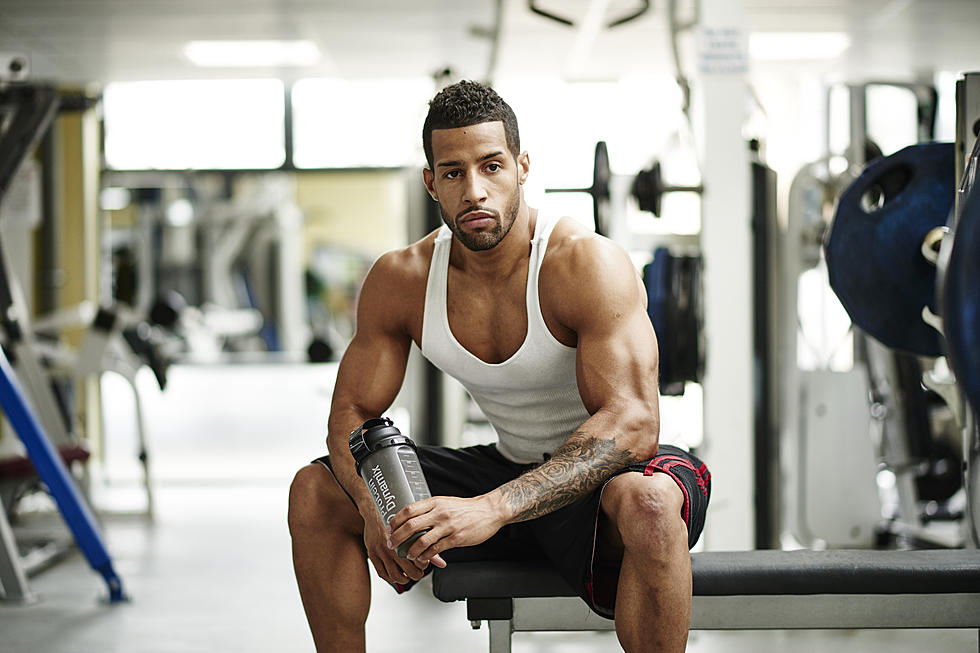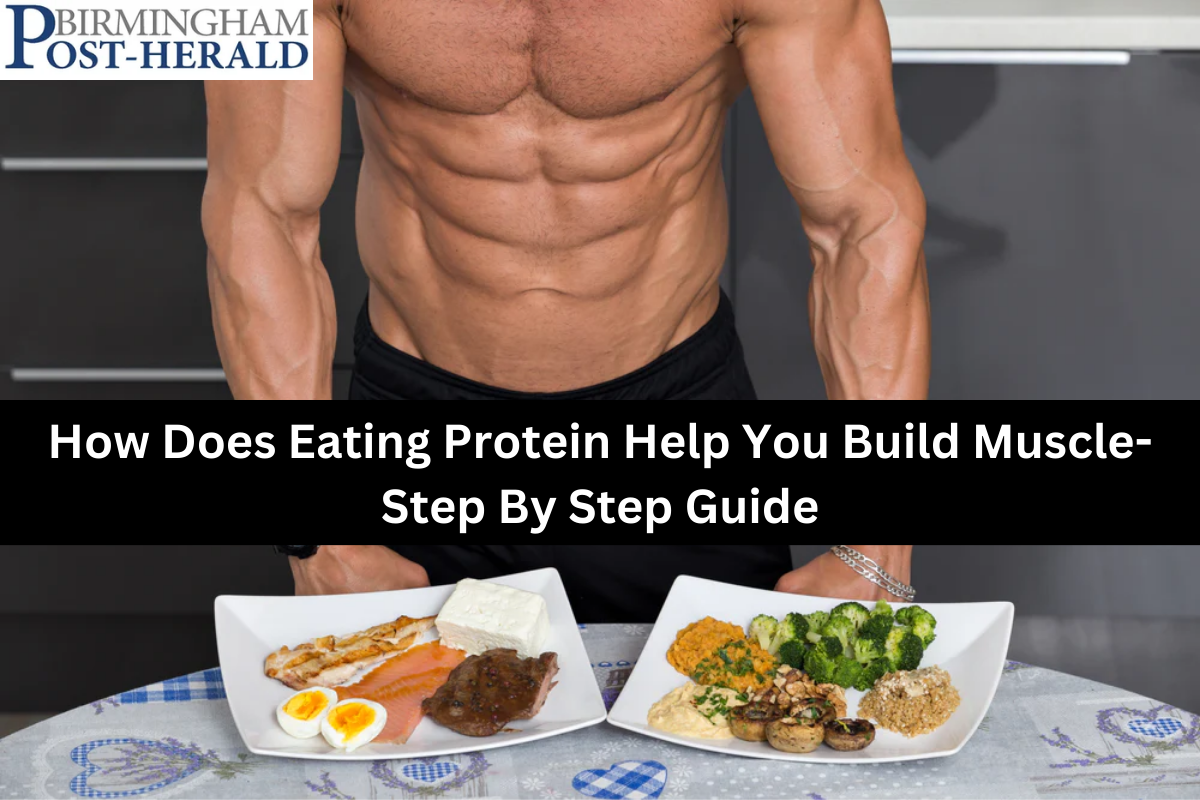How Does Eating Protein Help You Build Muscle- Step By Step Guide :- Protein is essential for life-sustaining functions in your body. Most biological functions require proteins, including immunological control, hormone production, growth, and more.
The majority of skeletal muscle is protein (80%). A protein-rich diet is essential for muscle growth and maintenance. Studies demonstrate that eating more protein than the RDA helps people grow muscle and maintain it during weight loss.
Why protein is crucial for muscle building and how to increase your protein consumption to build muscle are covered here.
How Does Eating Protein Help You Build Muscle- Step By Step Guide
:max_bytes(150000):strip_icc():format(webp)/ProteinForMuscleBuilding-5a85cc99ce144954bce6e334373cd1b8.jpg)
Why Does Protein Matter for Muscle Growth?
- You get amino acids, the “building blocks” of protein, from protein. After eating protein, your body breaks it down into amino acids, which are utilized to make new proteins and neurotransmitters.
- Certain amino acids are essential for muscular growth. For muscle maintenance and growth, branched-chain amino acids like valine, leucine, and isoleucine are crucial.
- Your body needs amino acids from protein-rich diets to maintain muscle mass and prevent breakdown. Building muscle requires more protein than sustaining muscular mass.
- A good net protein balance—muscle growth over muscle breakdown—is necessary for muscular hypertrophy.
- A negative protein balance, such as from a low-protein diet, causes muscular atrophy. A high-protein diet and resistance training prevent muscle loss and build muscle.
How Much Protein Do You Need Per Day?
- The body needs protein daily. The RDA for protein is 0.8 g/kg (0.36 g/lb). The RDA is considered the “ideal” protein intake, however it is the lowest amount needed to prevent muscle loss and meet amino acid demands.
- Sedentary persons can maintain muscle mass with the RDA, whereas active people and muscle gainers need more.
- Regular exercisers should consume 1.2-2.0 g/kg (0.54-0.9 g/lb.) of protein per day to maintain muscle mass, according to research.4Musclebuilders need more protein.
How Much Protein Do You Need to Build Muscle?

- Active persons require more protein than the RDA to maintain muscle mass, but muscle gainers need more. Experts recommend more than 2.0 g/kg (0.9 g/lb) of protein per day for muscle growth.
- Resistance training and protein intake can boost muscle growth, thus adults should consume 1.6 to 2.2 g/kg (0.72 to 1 g/lb.) daily.
- Some experts recommend 2.3 to 3.1 g/kg (1 to 1.4 g/lb) of protein per day to maintain or gain muscle and decrease fat.
- Eating more protein-rich meals and adding protein to every meal and snack may boost protein intake.
- Though specific protein-rich foods and amino acids stimulate muscle development, most experts think that total protein intake is more important.
- Animal proteins have all nine essential amino acids, while most plant-based proteins are “incomplete”. This is why plant-based proteins build less muscle than animal-based ones. Plant-based foods have less protein per serving and poor digestion, hence animal proteins are preferable for muscle protein synthesis.
- With a mix of plant-based proteins and supplements, you can build muscle on a plant-based diet.
Good Sources of Protein
Plenty of protein-rich foods are available for everyone, whether they eat meat or only plants. These foods are some of the best ways to get protein:
Animal Proteins
- Eggs: 6.28 g per large egg
- Chicken breast: 31 g per small skinless chicken breast
- Canned salmon: 19.6 g per three-ounce serving
- Whey protein isolate: 25 g per ounce
- Cottage cheese: 23.5 g per cup
- Shrimp: 20.4g per three-ounce serving
- Greek yogurt: 19.9 g per seven-ounce serving
Plant-Based Proteins
- Tofu: 8.67 g per three-ounce serving17
- Hemp seeds: 9.48 g per ounce18
- Pea protein: 24 g per ounce19
- Edamame: 18.5 g per cup20
- Tempeh: 19.9 g per 100g serving 21
- Lentils: 17.9 g per cup22
U.S. Department of Agriculture. Food Data central. Lentils, mature seeds, cooked, boiled, without salt.
A diversified diet including plant and animal proteins is suggested, however a plant-based diet has been associated to decrease heart disease and cancer rates.
Vegetarians and vegans should consume a range of protein sources to meet their daily protein needs.
Also See :- Suits La Spinoff Casts Female Lead
Tips for Consuming Protein for Muscle Growth
- Follow these evidence-based muscle-building tips.
- Experts recommend 1.6 to 2.2 g/kg (0.72 to 1 g/lb) of protein per day for weight maintenance and muscular growth.
- Energy restriction increases the risk of muscle loss, thus people seeking to lose weight while maintaining or growing muscle mass need 2.3 to 3.1 g/kg (1 to 1.4 g/lb.) of protein daily.
- Protein-rich meals should be three hours apart to promote muscle building, according to some experts. While total protein intake is most important, recent evidence suggests that supplementing with protein after resistance exercise may assist muscle development best.
- After resistance training, most experts recommend 20 g of high-quality protein like whey protein to promote muscle building.
- A protein drink or 20-g protein snack or meal after an exercise may help you accomplish your body composition goals.
Can You Have Too Much Protein?
- Despite kidney, heart, and bone issues, research suggests balanced high-protein diets are safe for most people. Fitness enthusiasts can comfortably consume more than four times the RDA for protein. Research is needed to determine if high-protein diets are unhealthy.
- A high-protein diet (3.4 g/kg/d) and rigorous resistance training improve body composition in healthy trained men and women, according to a follow-up research. International Sports Nutrition 12:39 (2015). Protein-rich diets boost heart, bone, and body composition.
- Some protein-rich diets may impair health and increase sickness risk. Consuming red and processed meat can cause colon cancer, heart disease, and other illnesses. High-protein diets don’t harm healthy persons but may exacerbate renal disease.
- Most healthy people can safely eat well-rounded high-protein meals, but your protein needs depend on body weight, age, and activity levels, so base your protein intake on your needs and health goals. Athletes and others who want to grow muscle and lose fat may need more protein than 1.2 to 2 g/kg (0.54 to 0.9 g/pound) per day.
- If you’re not sure how much protein to eat daily, a professional dietitian can help you develop a high-protein diet that fits your body composition goals.
Other Factors for Building Muscle
- Strength-train and eat protein to build muscle. Research shows resistance training increases muscle protein turnover and synthesis. Protein-rich diets are needed to maintain a positive net protein balance, prevent muscle breakdown, and increase muscle protein synthesis after strength training.
- Weight training without protein won’t improve body composition. Muscle growth requires resistance training and more protein. In 2023, 40 healthy older ex-military males grew higher muscular growth and strength than men who followed a 0.8 g/kg diet and three weekly strength training sessions.
- Newbies should start with a few shorter strength training sessions per week. As you gain strength, increase workout time and intensity.
IF you like this Article How Does Eating Protein Help You Build Muscle- Step By Step Guide Please share with your Friends and Family Members.
